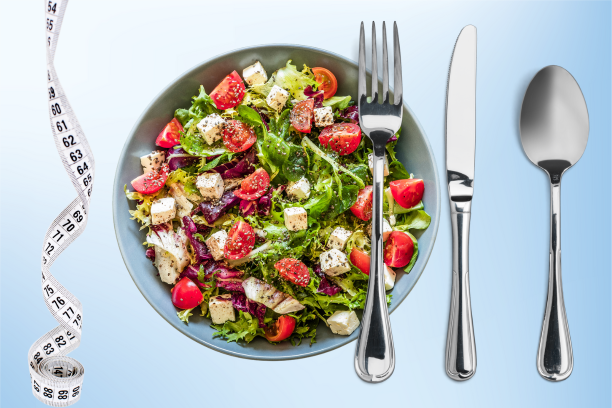

Commencing your day with a healthy, heartful breakfast may positively impact your weight loss efforts, energy levels, and hunger cravings. However, the benefits of breakfast may vary among people.
A well-rounded breakfast should include a combination of essential nutrients, including complex carbohydrates, protein, fiber, and healthy fats.
Choosing nutrient-dense foods for breakfast may kickstart your metabolism, stabilize blood sugar levels, and improve nutrient absorption.
This article will list 15 healthy breakfast options, including eggs, yogurt, smoothies, green tea, and more.
Nuts are nutrient-dense and rich in protein and healthy fats, which may promote satiety and help prevent overeating throughout the day. This satiating effect may benefit weight loss as it helps reduce total calorie intake.
They contain essential nutrients like vitamin E, antioxidants, and magnesium, which benefit overall health. Walnuts, almonds, peanuts, and pistachios could improve health and weight control outcomes.
The polyunsaturated and monounsaturated fats in nuts are associated with improved heart health. Including nuts in your breakfast may contribute to a heart-healthy diet and reduce cardiovascular disease risk.
Although nuts offer numerous health benefits, they are calorie-dense. It is important to practice portion control to avoid consuming excess calories. Limit your intake to around one ounce (28 grams) per serving to prevent excessive calorie consumption.
A cup (123g) of raspberries delivers 8 grams of fiber, 14.6g of carbs, and just 64 calories. The high fiber content of raspberries plays a vital role in weight management, and they could be a filling, low-calorie option for starting your day.
Their natural sweet profile could help satisfy your sugar cravings and limit sugary intake from unhealthy food sources. The raspberry ketone compounds in raspberries could aid in healthy weight loss.
Animal studies have indicated that raspberries’ antioxidant and anti-inflammatory virtues may reduce the risk of health concerns like diabetes, heart disease, and weight gain.
Yogurt contains live bacterial cultures that might benefit gut health. A healthy gut microbiome may optimize better digestion, nutrient absorption, and even weight regulation. Choosing yogurt with probiotics may contribute to a balanced and thriving gut environment.
Several studies have found that yogurt consumption may reduce body fat percentage, waist circumference, and body weight. Such findings indicate that adding yogurt to your breakfast could improve weight management outcomes.
Greek yogurt has a high protein content, which may help you feel full and satisfied throughout the morning. It is also a good calcium source that may support bone health and muscle function. Calcium also helps regulate metabolism and may assist in fat breakdown, potentially supporting weight loss efforts.
You could customize yogurt with toppings like fresh fruit, seeds, a drizzle of honey, or nuts. Its portability makes it a practical choice for busy mornings or as a post-workout snack to refuel and replenish nutrients.
One large egg (50.3g) contains 6.24g of protein, 4.35g of healthy fats, and just 72 calories. It also comprises essential nutrients, including selenium, riboflavin, calcium, and folate. Eggs are a highly nutritious food choice with potential benefits for weight loss.
Research has indicated that the protein-rich profile of eggs could help reduce appetite when consumed as part of breakfast. This virtue may significantly aid weight loss efforts by helping limit total calorie consumption.
| Nutrient | Amount | Role |
|---|---|---|
|
Protein |
High |
Supports muscle maintenance and feeling full. |
|
Selenium |
Adequate |
Essential for thyroid function and metabolism. |
|
Riboflavin |
Rich |
Supports energy production and metabolism. |
Including eggs in your breakfast may provide a good source of quality protein to help you feel satisfied and curb cravings throughout the day.
Two tablespoons of peanut butter contain around 191 calories, 1.6 grams of fiber, and 7 grams of protein, making it a nutrient-dense addition to your breakfast. Despite being calorie-dense, peanut butter provides essential nutrients beneficial for weight management.
Research has found that people who regularly consume peanut butter and peanuts tend to have a lower BMI than those who don’t. However, the precise mechanism by which peanuts aid weight maintenance remains unclear.
The protein and fiber profile of peanut butter may increase satiety, helping you feel full for longer and potentially reducing total calorie intake throughout the day. The healthy fats in peanut butter also enhance satiety and may aid in maintaining stable blood sugar levels when paired with other balanced breakfast foods.
When choosing peanut butter, choose varieties without added sugars or excessive salt to maximize its health benefits. Pairing peanut butter with whole grain toast, oatmeal, or fruit may create a well-rounded breakfast that supports your weight loss journey.
Smoothies are a convenient and nutrient-dense option for boosting your daily intake of essential nutrients and supporting your weight loss goals. They may provide a powerhouse of vitamins, minerals, fiber, and protein.
Including leafy greens like kale, spinach, or cabbage in your smoothie could add a nutritional punch while keeping the calorie count low.
Adding Greek yogurt to your smoothie could boost the protein content, which can help stay satiated for longer periods. However, be cautious with calorie-dense ingredients to avoid excess calorie intake.
Wheat germ contains minerals and vitamins, including selenium, thiamine, and manganese. These essential nutrients may support various bodily functions and aid weight loss.
With around 13 grams of fiber in 100g serving, wheat germ is a significant source of dietary fiber. The fiber-rich content of wheat germ may aid digestion, promote satiety, and support weight loss efforts. Wheat germ may benefit healthy weight management by positively impacting metabolism and contributing to a feeling of fullness.
Green tea contains compounds like catechins and caffeine that may increase metabolism. These effects lead to a higher calorie expenditure, potentially aiding your weight loss efforts.
Regular green tea consumption may be associated with a decrease in visceral fat, particularly in the abdominal area. Reduced visceral fat may decrease the risk of diabetes, stroke, or heart disease.
The catechins in green tea may enhance fat oxidation or the process of breaking down fats for energy. Such a mechanism may contribute to a reduction in overall body fat percentage. It may improve body composition and aid weight loss.
You may consume a cup of warm green tea in the morning. Try adding a squeeze of lemon, brew your tea with ginger or mint, or drizzle on a bit of honey to bring a tasty twist to your cup.
A medium banana (126g) contains 112 calories and provides 3.28 grams of dietary fiber, contributing to your daily fiber requirements. Research indicates that increasing fiber intake from fruits and vegetables could enhance weight loss outcomes.
Unripe bananas contain resistant starch, which could bypass digestion in the stomach and small intestine. As per a study by June Zhou and Maren Hegsted, resistant starch could help limit food consumption and decrease abdominal fat.
Including bananas in your morning meal may improve satiety due to their fiber content and also aid in regulating your calorie intake.
You may eat bananas alone, slice them on top of yogurt or oatmeal, or blend them into a smoothie. Bananas are a versatile fruit that may complement various breakfast options while supporting your weight loss journey.
Kiwis contain essential nutrients like vitamin C, potassium, and vitamin K and have a high fiber content. One cup (180g) of kiwis could provide up to 19% of your daily fiber needs.
Research studies indicated that consuming kiwis may help reduce body fat, improve blood pressure, and reduce inflammation. Kiwis could also enhance satiety, reduce appetite, and lower blood sugar levels. Their natural laxative properties may stimulate the movement of the digestive tract, supporting bowel regularity and digestive health.
A one-ounce (28.35g) serving of chia seeds has 138 calories, 4.68g of protein, and 9.75g of dietary fiber. Their high fiber and protein content could aid in weight loss by enhancing satiety and improving fat metabolism.
The fiber-rich profile of chia seeds may absorb water and expand in the stomach, helping curb hunger cravings and keeping you satiated for extended periods. The protein content in chia seeds might reduce ghrelin levels, the hormone that influences appetite.
A recent 2021 animal study suggested that chia seeds could improve the body’s fat metabolism. However, human studies on the weight loss effects of chia seeds have shown mixed results.
Oats are low in calories but high in protein and fiber. They contain beta-glucan, a fiber that could improve immune function and heart health.
The beta-glucan in oatmeal may help balance blood sugar levels, preventing spikes and crashes that may lead to increased appetite and overeating. Such effects might help limit total calorie intake, potentially inducing weight loss. The fiber and protein in oatmeal may improve satiety, possibly reducing the likelihood of overeating throughout the day.
Flaxseeds contain viscous fiber that may positively impact weight loss and appetite control. The soluble fiber, such as that found in flaxseeds, could delay digestion. It may reduce appetite and calorie intake, supporting your weight loss efforts.
Research studies have concluded that including flaxseeds in the diet could result in noticeable reductions in belly fat, BMI, and body weight. These findings highlight the effectiveness of flaxseeds in improving weight control outcomes. Whole flaxseeds may reduce elevated blood sugar levels and minimize insulin resistance. Such a mechanism may prevent spikes and blood sugar crashes that may increase hunger and food cravings.
A 100g serving of grapefruit contains around 88g of water content, 42 calories, and 1.6g of fiber. It also comprises essential nutrients like calcium, potassium, folate, and vitamin C. Grapefruits may aid in weight loss, possibly due to polyphenols like naringenin, which could support metabolism. However, the research on grapefruit’s direct impact on weight loss is inconclusive, indicating a need for further studies. Grapefruit consumption and a calorie-restricted diet may lead to noticeable reductions in body fat, waist circumference, and body weight. It highlights the potential of grapefruits in supporting weight loss.
The caffeine content of coffee could increase the metabolic rate, enhancing the calories burned throughout the day. It may assist in the fat breakdown (fat oxidation), making stored fat cells available for energy production. Such effects may enhance the body’s ability to utilize stored fat for fuel, potentially aiding weight loss.
It might raise adrenaline levels in the body, improving physical performance during exercise. This boost in energy and endurance could push harder during workouts, possibly leading to more significant weight loss results.
Coffee and green tea are breakfast foods that may boost metabolism more efficiently than other options due to their caffeine content. Protein-rich options like eggs and Greek yogurt could also enhance metabolism.
Eating breakfast before noon could positively impact metabolism, calorie distribution, and nutrient absorption. Breakfast choices at the right time may support energy balance, regulate appetite, and optimize body composition for improved weight management.
Probiotic-rich foods (e.g., yogurt) during breakfast may aid weight loss by promoting a healthy gut microbiome, which may impact metabolism and digestion. However, individual results might vary.
No specific food(s) could directly target belly fat reduction. Breakfast foods like berries, oatmeal, yogurt, peanut butter, and eggs may support weight loss goals, which might contribute to reducing belly fat.
Micronutrients in a weight loss breakfast could support metabolism, energy levels, and overall health. They contribute to cellular functions, nutrient absorption, and can aid in appetite control, enhancing the effectiveness of a weight loss regimen.
The foods you consume during breakfast may significantly impact your metabolism, energy levels, and weight control.
Including healthy foods like eggs, peanut butter, wheat germ, and oatmeal may reduce your total calorie intake and aid in weight loss.
Avoiding sugary snacks and beverages, processed foods, and sugar-laden breakfast cereals could complement your weight loss efforts. Swapping these unhealthy breakfast choices with the foods mentioned in the article could encourage healthy weight loss.
Trying intermittent fasting, eating mindfully, increasing exercise frequency, and getting enough sleep are some natural ways to target and achieve weight loss goals.
Tyler Read earned an undergraduate academic degree from Sonoma State University, California and is a certified personal trainer (CPT) with NASM (National Academy of Sports Medicine). With over 16 years of experience, Tyler has trained clients both online and in-person.
He is passionate about helping others turn their love for fitness into a career. Tyler has worked with many local and commercial gyms before establishing his successful private personal training business, which he continues to operate.
